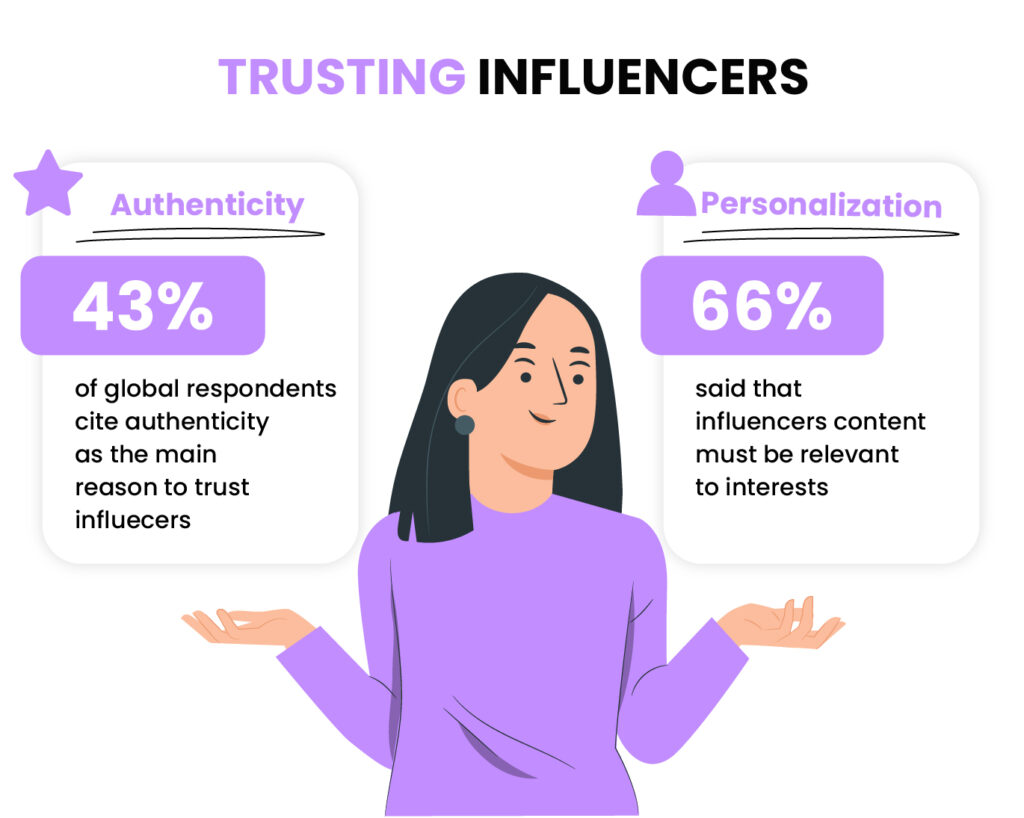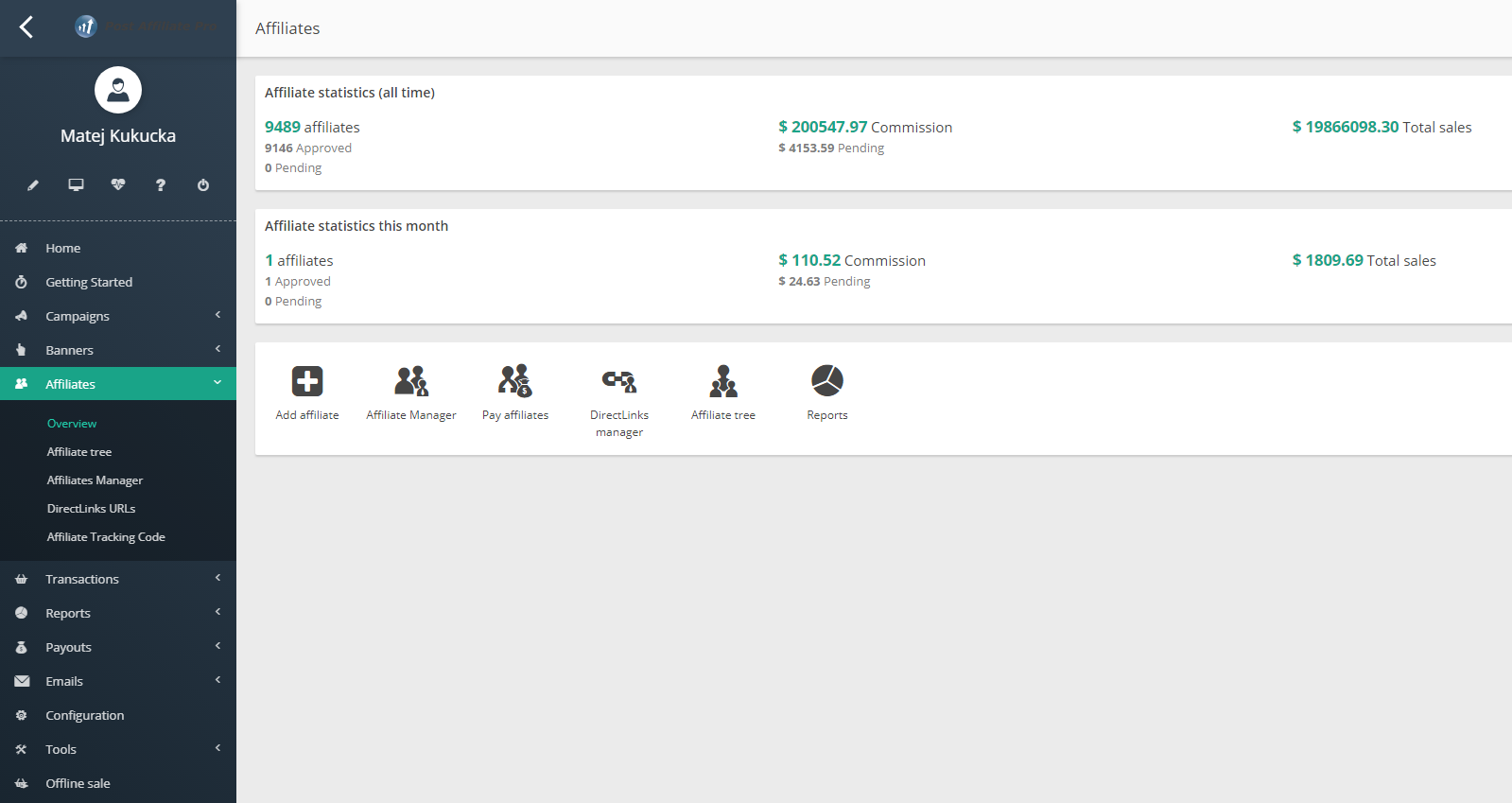
6 Reasons Blogs and Influencers Avoid Your Affiliate Program
Discover six key reasons why bloggers and influencers avoid joining your affiliate program. Learn how to make your offer more appealing by simplifying processes...

Learn how to combine affiliate marketing with influencer marketing to maximize reach, build trust, and drive conversions through social media partnerships.
Last week, I went to Starbucks for a cup of coffee and overheard this conversation between two young entrepreneurs who were trying to find new ways to get more business. Apparently, their eCommerce business has been going well, so they were discussing new marketing ways to let more people know about their products. If I were looking to partner with a startup, I would definitely consider talking with them.
The ideas for online promotion they were discussing were really interesting and forward-looking. Except one.
“Everybody is an influencer now and people are tired of that. Besides, the two don’t really go that well together. I think we should go with our current strategy and look for opportunities elsewhere.”
This was the reaction of one of them to an idea to explore influencer marketing. Apparently, their brand was doing quite a bit of affiliate marketing , but for some reason, they decided that influencer marketing won’t do any good to them.
Don’t get me wrong, this is not the first time I hear something like this. Many entrepreneurs perceive influencer marketing as a bad addition to their strategy because of the overwhelming number of people who consider themselves influencers.
Well, blogging was also once considered as nothing but a hobby. But now, blogging is a legit marketing technique that, if implemented properly, can get your business on the first page of Google results as well as help to build a sizable lead base.
If not, why would 86 percent of B2C businesses use content marketing – blogging included – as a part of their digital marketing strategy?
The fact that a lot of people are trying to be influencers doesn’t mean that using influencer marketing is a bad idea. In fact, influencer marketing has been developing at the speed of light in recent years, with an increasing number of businesses investing thousands in this strategy. For example, Instagram influencer marketing spending worldwide is quickly increasing; it reached $5.67 billion in 2018 and is projected to hit the mark of $8.08 billion by the end of 2020.
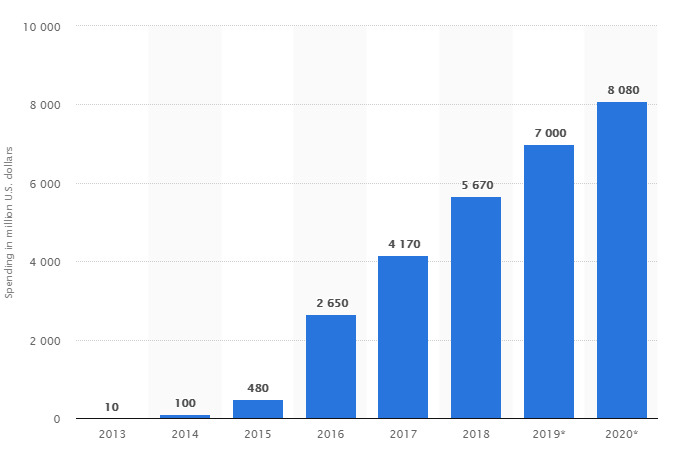
Image Credit: Statista
So, why would businesses around the world continue to pour money into influencer marketing if doing so would be like throwing money out the window?
Exactly.
And is the combination of affiliate marketing and influencer marketing worth pursuing?
Absolutely!
If you know how to do it properly, of course.
Historically, affiliate marketing has been driven by the need to get website clicks, but now things are changing a little bit. The traditional affiliate marketing techniques are being added more with the new ones, and these are focused on cultivating leads from social media platforms.
That’s where influencers do their magic.
They have that amazing ability to inspire conversions from their followers, which is something that affiliate marketing could really use. So, it could be said that influencer marketing enhances traditional affiliate marketing techniques by introducing them to content-driven audiences who use social media on a daily basis.
Influencers will surely be responsible for a large part of the U.S. affiliate marketing spending, which by the way, is projected to reach $6.8 billion by the end of 2020, according to eMarketer.
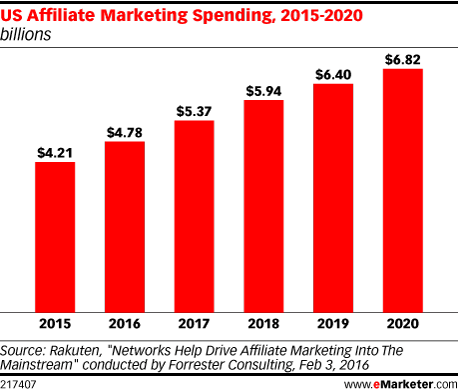
Credit: eMarketer
So, it makes perfect sense for social media-savvy affiliates to try and create meaningful influencer campaigns that leverage the reviewing and buying power of influencers. By doing things this way, a business goes beyond website clicks and focuses on the main thing that drives purchases in younger generations: long-term relationships with brands that turn customers into loyal followers.
An influencer thus becomes a critical intermediary in fostering these meaningful relationships between a business and a customer by sharing tips, recommendations, and other information that the customer can use. For example, here’s how Cristine Rotenberg, an Instagram & YouTube influencer with a username Simply Nailogical, promotes clothing brand called Roots in this post on Instagram.

Credit: Instagram
So, thinking that influencer marketing and affiliate marketing cannot be combined is simply unreasonable.
But how can a business actually do it? Read below to find out.
First, let’s make sure that you understand what you’re getting yourself into. The best way to think about an influencer is a unique type of partner for affiliate marketing . Why unique? Because he or she has several qualities that are critical to success, including marketing experience, direct access to your target audience, authority in your market niche, and a certain degree of expertise in technology and social media areas.
But the most important quality that influencers have is trust. Every effective influencer has a certain number of followers who are interested in their lifestyle tips, product recommendations, and other information. The trust of followers allows influencers to use traditional affiliate methods very effectively because the people reading or otherwise consuming their content are interested in recommendations from them.
So, working with a decent influencer whose market niche happens to relate to your products or services provides you with direct access to your target audience. By partnering with an influencer, in this case, you’re increasing the chance of conversion because the audience is relevant and interesting in learning more about products or services you sell.
So, this means that you’ll have to do influencer research to find a relevant one for your business. He or she should have decent followership, a good reputation, and some experience with affiliate partnerships. There are two ways you can go about this: the first one is manual research; you go to a selected social media network and look for an influencer there using keywords or use Google for that.
The second way is to use a special tool for influencer research. Thankfully, there are a number of those tools out there; some of the good ones include Buzzsumo Influencer Research (paid, a free trial available) and Social Bakers (free up to three influencers, a demo available).
For example, here are the results generated by Social Bakers for Fitness and Wellness category in Australia and New Zealand region.
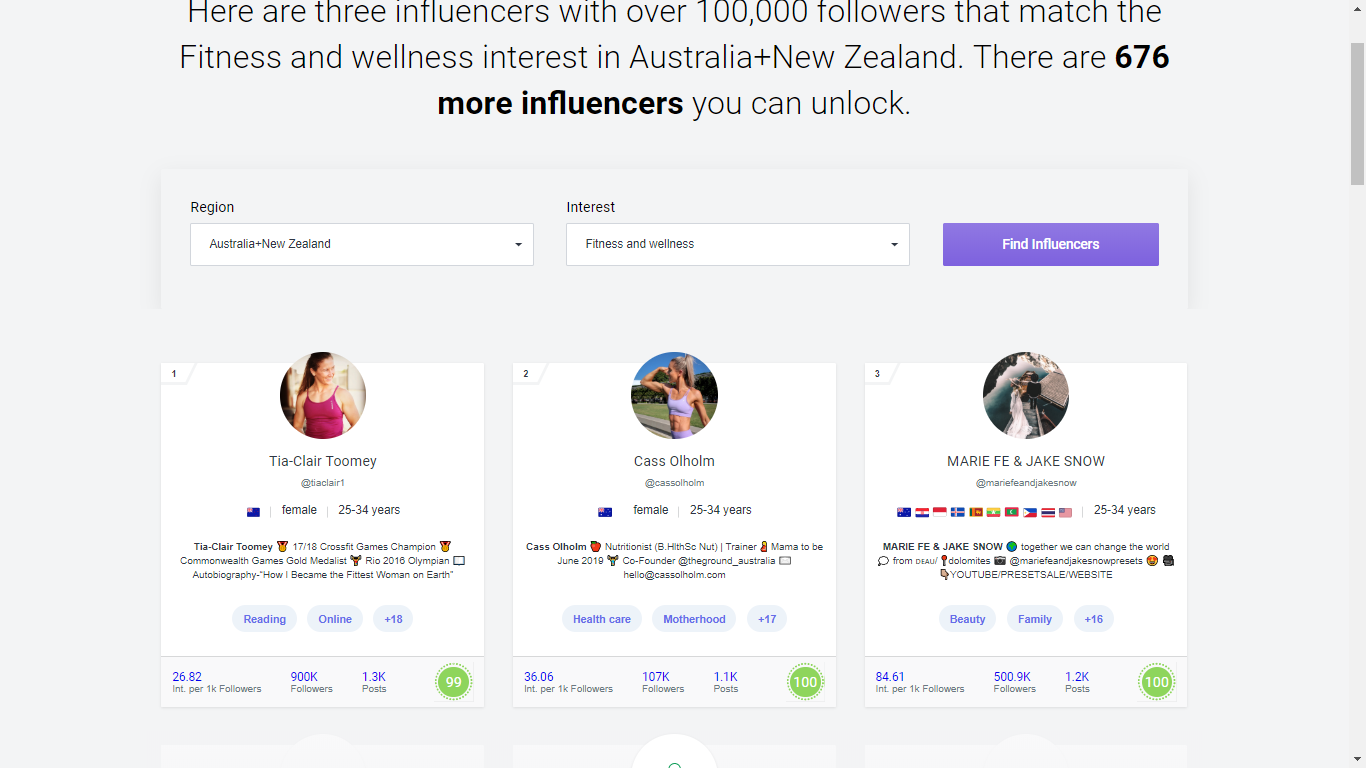
Source: Screenshot
As you can see, it’s possible to search for influencers in specific countries (and even areas, depends on the tool you’re using), so finding a decent option quickly shouldn’t be a problem. What’s a little bit more difficult, however, is determining whether an influencer is perfect for your business. For that, you’ll need to analyze their profiles and learn the following:
As soon as you identified the influencer you think can be a good fit for your brand, it’s time to talk about business. The first contact with an influencer is something that you should be prepared for, so here’s what you need to know.
If you want to use an influencer in your affiliate marketing strategy, you’ve got to have a killer pitch. The most popular way to contact influencers is by an email or a direct message on social media, so choose your preferred method of communication. Your main goal at this point is to write a great message with the information about your goals, products, and your vision of success.
Write your message in simple, conversational language, and be as straightforward as possible in your message so you don’t come off as pushy. Keep in mind that you’re making them a business proposal (by the way, not treating an affiliate like a business partner is one of the most common mistakes that people do when starting an affiliate program ), and no influencer wants to be a puppet of any brand; in fact, influencers know that they will lose followers if their messages are perceived as fake.
There are several ways in which you can approach writing a message to influencers. Below, we’re going to give you a good example of an email asking an influencer to be an affiliate partner:
Hi [name of the influencer],
My name is [your name], a Baltimore-based coffee brand. We’ve been reading your blog for quite a while and we’re really loving your writing style and tips.
I’m writing this message because we think that you would be an amazing ambassador for our brand.
Are looking for business opportunities at the moment? We would love if you could come on board as an affiliate partner.
If you are, we are ready to share our products with you, so you could try them and give your thoughts about them to your online community in a post.
As a thank you, we will also provide you with an affiliate code so you can earn some commission from your influence.
Please let us know what you think about this: if you’re interested, we are ready for a chat. Feel free to reply to reach out to us by replying to this message.
Thank you! We’re looking forward to hearing from you.
Kind regards,
[Your name].
As you can see, this message begins with the sender complimenting the influencer, which is a good start that can grab their attention. Then, the sender describes the value of the program as well as what they expect from the influencer. Writing in this style ensures that the message reads like a personalized invitation to be an affiliate partner. Besides, the message read genuine because it tries to show that the brand has selected this particular influencer based on their experience.
Reaching out to an influencer with a request for an affiliate partnership is something you should consider doing to reach more people in a very special way. Influencer marketing has been developing at the speed of light in recent years, and it doesn’t show any kinds of stopping. I recommend you not to listen to those saying that influencers are boring because everyone tries to be one because it’s a legit strategy with thousands of businesses around the world investing millions into it.
Hopefully, this guide has inspired you to know more about influencer marketing and how to use it along with affiliate marketing. Feel free to share your experiences with affiliate partnerships with influencers with us to let us know what tips have worked for you the best!
Combining affiliate and influencer marketing leverages the trust influencers have with their audience, expanding reach, increasing conversions, and building long-term customer relationships.
Research influencers in your niche using social media, Google, or specialized tools like Buzzsumo and Social Bakers. Analyze their audience, engagement, content quality, and reputation before partnering.
Reach out via email or direct message with a personalized, straightforward pitch. Clearly outline your goals, expectations, and the benefits for the influencer, treating them as a valued business partner.
Micro-influencers often have highly engaged audiences and can deliver more authentic recommendations. Their smaller but loyal following can result in higher conversion rates and better brand trust.
Track key metrics such as clicks, conversions, affiliate sales, and engagement rates. Use tracking links and analytics tools to monitor performance and adjust your strategy for optimal results.
Daniela used to be passionate about writing when she was in college. Now that she is a grown-up she decided to make it more than just her hobby. Her professional interests lie within IT and marketing fields. Currently, she is writer and editor at Ratedbystudents.
Start leveraging influencer partnerships to supercharge your affiliate marketing. Discover actionable tips and tools to grow your business.
Discover six key reasons why bloggers and influencers avoid joining your affiliate program. Learn how to make your offer more appealing by simplifying processes...
Is your business looking to expand with affiliate or partner marketing? Learn more about the differences and benefits with Post Affiliate Pro.
Learn proven strategies to attract top influencers to your affiliate program. Master program simplicity, tracking, competitive rewards, and professional communi...
Cookie Consent
We use cookies to enhance your browsing experience and analyze our traffic. See our privacy policy.
